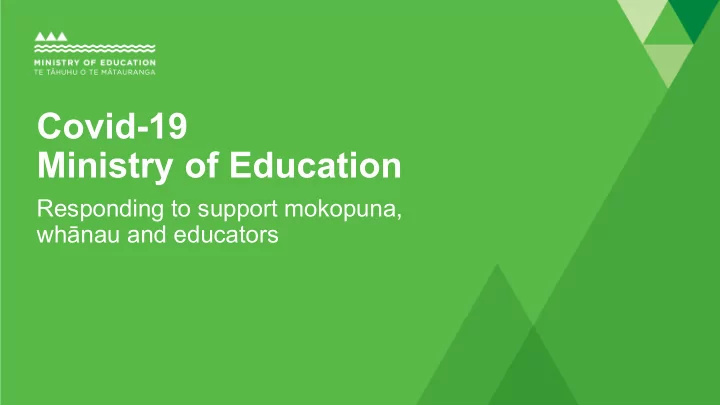

The image part with relationship ID rId2 was not found in the file. Covid-19 Ministry of Education Responding to support mokopuna, whānau and educators
School attendance builds mental wellbeing and provides access to services and supports Early learning service and school disruption during Covid-19 caused: • interruption of learning (like that experienced over longer holiday periods) • decreased access to supports for health and wellbeing, particularly for the disabled community • a decrease in the development of individual protective factors, and a • lack of surveillance to identify issues that early learning services and school provides • Highlighted the material inequity experienced by mokopuna, and whānau . For children at risk and the disabled community, taking into account the contexts in which they live; “risk exacerbation” was probably significant: education.govt.nz education.govt.nz
Indicators influencing mental health need Initial data indicates: • Increased referrals to agencies when schools and early learning services re-opened (Family Violence Data Dashboard). • Referrals similar to previous years, monthly record – indicating schools are important identifier of issues and therefore supports for mokopuna, and whanau. Re-opening of learning services data shows attendance rates are: • Slightly lower in schools to 85%, and • Down to 50% in early childhood education centres (lower than pre Covid-19 levels). • Much lower in some areas. • Some children and families have not returned education.govt.nz education.govt.nz
What is planned for the “recovery” phase? Education is a social determinate of health and it is the most modifiable of all social determinates (Marmot et al., 2010). Initiatives include: • Urgent Response Fund • Educator wellbeing • New Curriculum Leads • Greater access to support for tertiary students • Specialist service changes • Continued investment to meet needs education.govt.nz education.govt.nz
Initiatives Urgent $50 million dollar Response Fund • Giving immediate support to early learning services, schools and kura to improve attendance, and to help manage any learning, social, emotional, mental, or other wellbeing needs • Providing an opportunity to understand more about the needs of mokopuna, whānau and educators in schools and early learning services • Opportunity to be used flexibly by schools and early learning services. For example to employ social workers and teacher-supports to work with students not regularly attending or migrant families. $16 million for Educator wellbeing • $16m will go to workplace assistance and counselling support services for the education workforce and their families. This will benefit 10,000 additional teachers and other school staff by 2022. Teachers, principals, support staff and centre leaders have done a great job during the pandemic and they’ll continue to play a vital in the recovery.” education.govt.nz education.govt.nz
Initiatives $32.8 million for 40 new Curriculum Leads To embed high quality teaching approaches to mental health, wellbeing and healthy relationships in learning programmes and local curricula. Are also a response to the Education Conversation | Korero Mātauranga , where young people, families, whānau , communities and educators asked for more of a focus on learner and educator wellbeing. Initially curriculum leads will: • support teachers to deliver high quality Health and Physical Education and Hauora programmes, including the Wellbeing and Mental Health Guidelines and the Healthy Relationships and Sexuality Education Guidelines • Partner with schools and communities to design Health and Physical Education programmes • Promote environments relating to wellbeing, including through work with Learning Support Co-ordinators, guidance staff, Boards, communities , educators and Māori and Pacific organisations. education.govt.nz education.govt.nz
Initiatives Greater access to support for tertiary students Making funding available to support tertiary students to access additional supports and services. • $25 million in new funding to expand front line mental health and wellbeing services for tertiary students. These new services will be embedded within tertiary settings to ensure ease of access and will include access to counselling and other treatments as well as peer support, self-management support and links to social and wellbeing supports. education.govt.nz education.govt.nz
Initiatives Specialist service changes During covid-19 positive engagement occurred with families, including difficult to reach families through innovative, and flexible practices. We are continuing to explore how we can build on this learning for specialist support. ( Schools have a range of provisions that build on targeted and individual responses for groups of students with additional wellbeing needs. e.g. social workers and nurses in schools, RTLB and specialist staff (Psychologists, OT, PT and speech language teachers, early intervention teachers.) New Learning Support Co-ordinator (LSC) roles started 2020 to provide a consistent point of contact for learners, whānau , teachers and school leaders to facilitate joined up, seamless support. This will include supports related to mental wellbeing. education.govt.nz education.govt.nz
Initiatives Continued investment to meet needs The Ministry has a comprehensive suite of universal and tailored supports to enable schools to build enquiry based, safe, supportive, relational learning environments. We are working across government and with stakeholders to further strengthen these provisions in support of the mental wellbeing of all ākonga after Covid-19. We will build supports and responses to meet needs identified through the Urgent Response Fund We will continue working with the Ministry of Health to extend the understanding and use of social emotional learning practices in classrooms through SPARKLERs www.sparklers.org. • Sparklers is made up of over 50 wellbeing activities. Each activity is linked to the five key competencies of the New Zealand Curriculum. Sparklers includes a teacher guide, classroom tips, and parenting guides. Sparklers activities are designed so that they can be easily picked up and used in the classroom. We know that ākonga Māori are at greater risk of poorer mental health outcomes than non - Māori and that supporting positive cultural identity is an important protective factor for Māori. • Growing range of strategies, resources and initiatives including Ka Hikitia, Tā Taiako (cultural competencies for teachers of Māori learners, Huakina Mai, and Te Mana Tikitiki, to support schools and teachers to affirm the language, culture and identity of ākonga Māori. education.govt.nz education.govt.nz
Questions about the supports for mokopuna, whānau and educators– education.govt.nz education.govt.nz
Recommend
More recommend